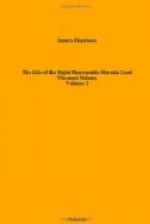it!” he would frequently exclaim to his friends,
when he beheld any one unprovided for, of whom he
had a good opinion, however slight the acquaintance:
and these exclamations were generally followed up
by naming some situation suitable for the party, and
immediately using all his interest to obtain it.
Innumerable are the persons whom he thus comfortably
fixed, with their families, for life. Where he
could not succeed, he felt more than the party disappointed;
and, on such occasions only, lamented his limited
powers. Never did man live less for himself.
To his king and his country, his family and his friends,
his life was entirely devoted; the promotion of their
felicity and glory, was the chief source of his own.
For himself, he had wealth more than sufficient; but
he was too poor, satisfactorily to assist those who
were most dear to him. Had his remunerations,
and his honours, been as largely proportioned to those
of the Great Duke of Marlborough, as his merits, and
his services, he would not only have aggrandized his
own family and friends, but proved a most munificent
patron of genius, and a bountiful dispenser of relief
to every species of human misery. Posterity will
say, and it cannot be denied, that our first naval
hero was rewarded with too parsimonious a hand.
Should we ever see his equal, in all respects—which
seems no more likely than that we shall behold another
Shakspeare—it will probably be thought,
that he is not unworthy of a dukedom. The King
of Naples, as the ally of his British majesty, restored
to his throne by Lord Nelson, deemed our hero entitled
to the honour of a ducal coronet, with the princely
revenue of a dutchy; and it can never be enough lamented,
that any official etiquette, in his own country, should
have prevented the gracious sovereign who so sincerely
loved him, and who was so sincerely beloved by the
hero, from bestowing on him, at least, an equal degree
of dignity, with the correspondent domains and emoluments
for it’s due support. How many naval commanders
have enriched themselves, by fortunate captures of
unopposing treasure-ships, or on long preserved snug
stations, without the smallest personal hazard, to
a degree far beyond what his lordship ever acquired,
who was continually engaged in scenes of the utmost
fatigue and peril! All the prize-money he got,
was by hard fighting; and it was, in general, only
derived from the capture of those ships which his
tremendous valour had frequently rendered wrecks of
little value. Even then, but a small portion fell
to his share; as he had, both at the Nile and Copenhagen,
two of the greatest victories ever gained, a commander
in chief who was regularly entitled to prodigiously
more than himself. It is by no means pretended,
that the captors of rich prizes, the possessors of
advantageous stations, and commanders in chief, are
not all of them justly and most honourably entitled
to the vast wealth they have often the good fortune
to acquire; it is only lamented, that our hero was,




